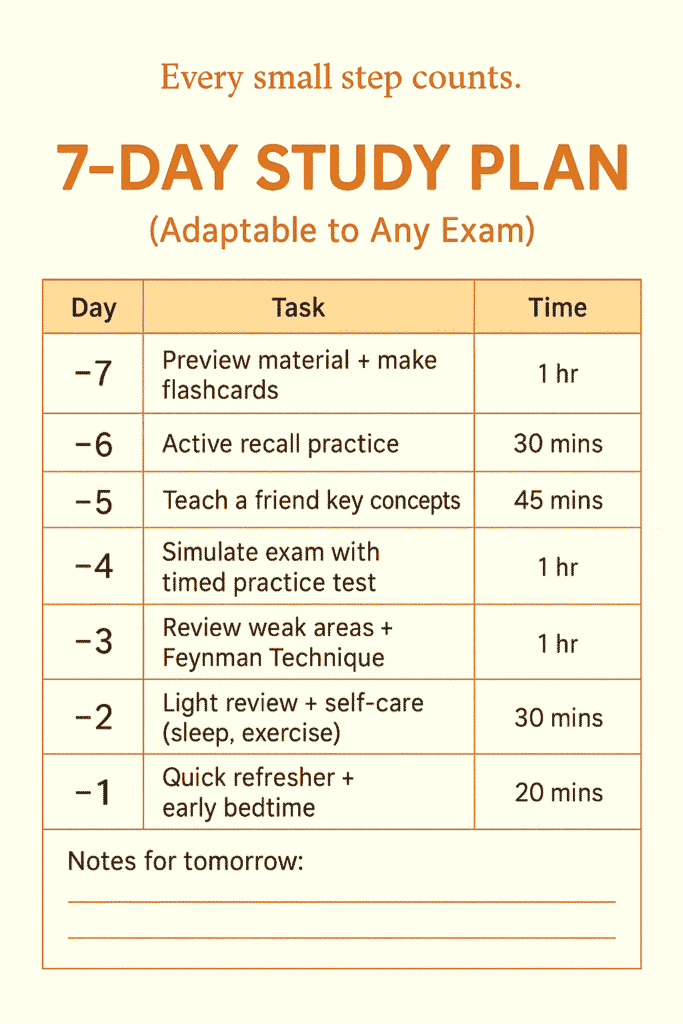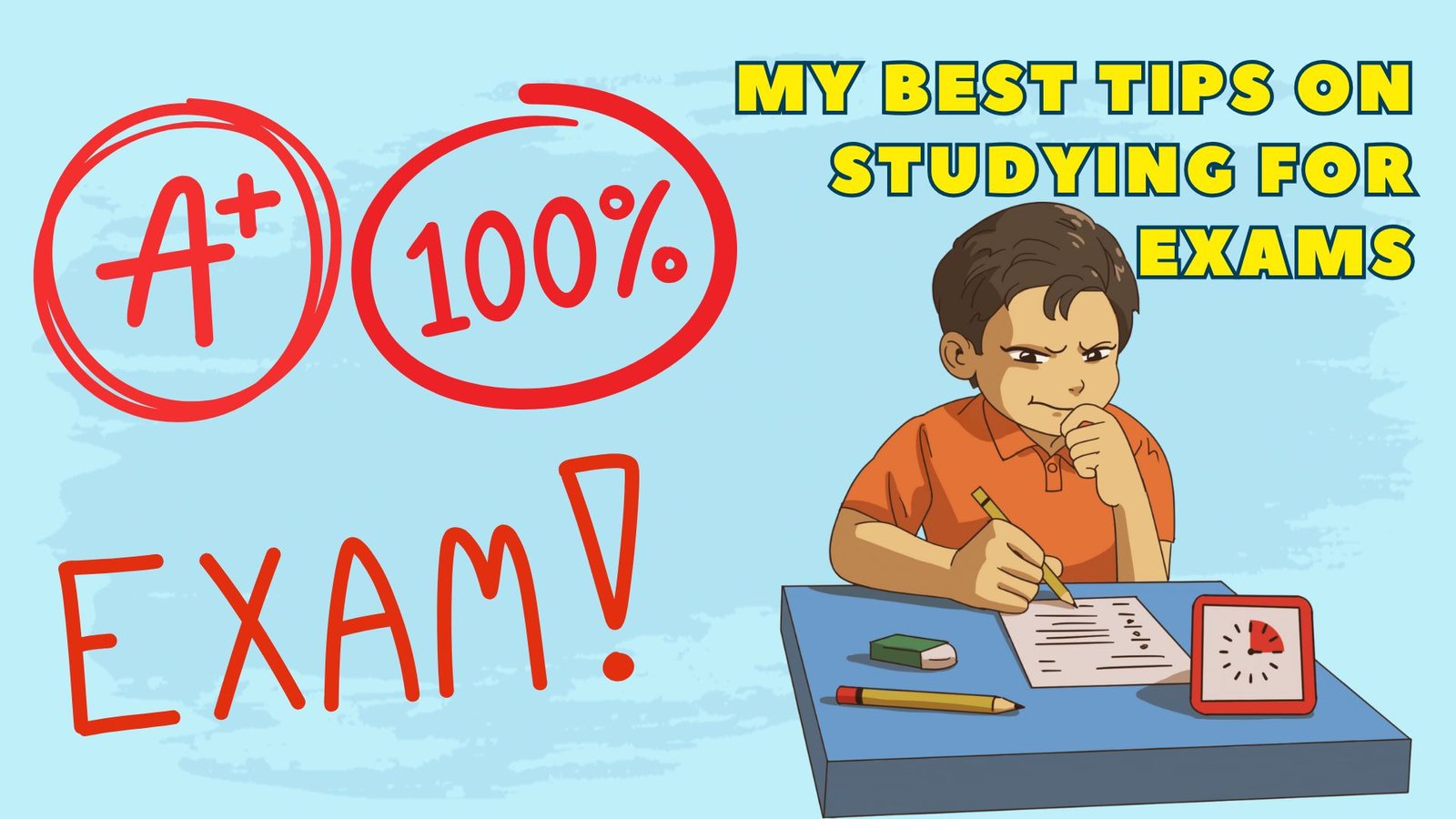Do you ever study for hours, only to blank out during the exam?
Or worse—do you cram the night before, promising yourself you’ll never do it again… only to repeat the cycle next time?
You’re not alone. 90% of students admit they don’t study effectively—wasting time on passive rereading, last-minute cramming, and other useless habits that sabotage their grades.
But what if you could study smarter, retain more, and slash stress—without pulling all-nighters?
After analyzing dozens of studies and expert strategies, I’ve distilled the most powerful exam-prep techniques used by straight-A students, memory champions, and learning scientists.
Let’s move in.

1. Ditch Cramming—Use the “Spaced Repetition” Secret
Why it works: Our brains forget 70% of new info within 24 hours—unless we review it strategically.
How to do it:
- Day 1: Learn the material
- Day 2: Review for 10 mins
- Day 7: Review again
- Day 14: Final refresher
Result? 2X better retention than cramming.
Pro tip: Use apps like Anki or Quizlet to automate spaced flashcards.
2. The “Active Recall” Hack (Used by Memory Champions)
Passively rereading notes? Waste of time. Instead:
- Close your book and write down everything you remember
- Quiz yourself with practice questions
- Teach the material aloud (even to an imaginary class)
Science says: Active recall strengthens memory pathways 3X more than passive review.
3. Master the “Pomodoro Technique” for Laser Focus
How it works:
- Study for 25 mins (zero distractions)
- Take a 5-min break (walk, stretch, hydrate)
- Repeat 4x, then take a 30-min break
Why? Your brain absorbs info best in short, intense bursts.
Bonus: Use apps like Forest to block distractions during focus sessions.
4. Hack Your Environment for Maximum Productivity
The Perfect Study Spot Checklist:
✅ Quiet but not silent (white noise or lo-fi beats help)
✅ Bright lighting (dim light = drowsy brain)
✅ Phone on airplane mode (or in another room)
✅ All materials ready (notes, water, snacks)
Pro tip: Rotate locations (library, café, park) to boost memory retention.
5. The “Feynman Technique” for Complex Topics
Struggling with tough concepts? Explain them like you’re teaching a 5-year-old:
- Write the topic at the top of a page
- Explain it in simple words
- Identify gaps → relearn those parts
- Simplify again
“If you can’t explain it simply, you don’t understand it well enough.” — Richard Feynman.
6. Fuel Your Brain Like a Pro
Eat These for Better Focus:
- Omega-3s: Salmon, walnuts (boosts memory)
- Antioxidants: Blueberries, dark chocolate
- Complex carbs: Oatmeal, whole grains (slow energy release)
Avoid These:
❌ Sugar crashes (candy, soda)
❌ Heavy meals (sleepiness)
❌ Too much caffeine (jitters + crashes)
7. Sleep Your Way to an A
Fact: Just one night of poor sleep reduces recall by 40%.
Pre-Exam Sleep Plan:
- 7-9 hours for 3 nights before the test
- No screens 1 hour before bed (blue light disrupts sleep)
- Power nap (20 mins) if exhausted
8. Conquer Test Anxiety with These Tricks
Before the Exam:
- Arrive early to settle in
- Do a “brain dump”—write down key formulas/facts immediately
- Breathe: 4-7-8 technique (inhale 4 sec, hold 7, exhale 8)
During the Exam:
- Skim first, answer easy questions, then tackle hard ones
- Watch for keywords like “compare” vs. “define”
- Never leave blanks—guess logically if stuck
Your 7-Day Study Plan (Adaptable to Any Exam)
| Day | Task | Time |
|---|---|---|
| -7 | Preview material + make flashcards | 1 hr |
| -6 | Active recall practice | 30 mins |
| -5 | Teach a friend key concepts | 45 mins |
| -4 | Simulate exam with timed practice test | 1 hr |
| -3 | Review weak areas + Feynman Technique | 1 hr |
| -2 | Light review + self-care (sleep, exercise) | 30 mins |
| -1 | Quick refresher + early bedtime | 20 mins |
Final Tip: The “Post-Exam Debrief”
After the test, analyze what worked:
- Which study methods helped most?
- Where did you struggle?
- How can you improve next time?
“The more you reflect, the better you’ll get.”
Now It’s Your Turn!
Which strategy will you try first? Drop a comment below—let’s crush those exams together! 🚀
Want More? Explore:
Remember: Smart work > hard work. Now go study like a pro!

